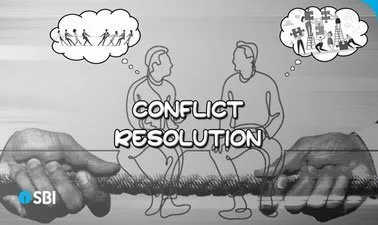
Conflict Management Project 
This project provides students with the opportunity to apply their knowledge of conflict management, resolution, and intercultural communication to a real-world situation. Through the creation of a conflict management portfolio, students will explore the roles of participants, incompatible goals, power imbalances, and communication skills needed to effectively manage the conflict. ▼
ADVERTISEMENT
Course Feature
![]() Cost:
Cost:
Free
![]() Provider:
Provider:
Coursera
![]() Certificate:
Certificate:
Paid Certification
![]() Language:
Language:
English
![]() Start Date:
Start Date:
12th Jun, 2023
Course Overview
❗The content presented here is sourced directly from Coursera platform. For comprehensive course details, including enrollment information, simply click on the 'Go to class' link on our website.
Updated in [March 06th, 2023]
By taking this course, you will gain the knowledge and skills to effectively manage conflicts in the workplace. You will be able to create a well-organized and complete case study, analyze key organizational issues with an integrated action plan for conflict resolution, identify appropriate communication skills needed for conflict resolution, present a portfolio that incorporates concepts learned throughout the Specialization, and reflect on what you've learned throughout the Specialization. This course will provide you with the tools to effectively manage conflicts in the workplace and help you to become a better leader.
[Applications]
Upon completing this course, students can apply the knowledge and skills they have acquired to their own workplace or other contexts. They can use the conflict management portfolio to analyze and resolve conflicts in their own organizations. They can also use the communication skills they have learned to effectively manage conflicts in intercultural contexts. Additionally, they can use the reflective component of the portfolio to assess their own conflict management skills and identify areas for improvement.
[Career Paths]
1. Conflict Resolution Specialist: Conflict resolution specialists are responsible for helping to resolve disputes between parties. They use a variety of techniques to help parties come to an agreement, such as mediation, negotiation, and arbitration. They must be able to identify the underlying causes of the conflict and develop strategies to address them. As the world becomes increasingly interconnected, the demand for conflict resolution specialists is expected to grow.
2. Intercultural Communication Consultant: Intercultural communication consultants help organizations and individuals bridge cultural divides. They provide advice on how to effectively communicate across cultures, as well as how to navigate cultural differences. They must be knowledgeable about different cultures and be able to identify potential areas of misunderstanding. As the world becomes more globalized, the need for intercultural communication consultants is expected to increase.
3. Conflict Management Trainer: Conflict management trainers are responsible for teaching individuals and organizations how to effectively manage conflicts. They must be knowledgeable about different conflict resolution techniques and be able to teach them in an engaging and effective manner. They must also be able to identify potential areas of conflict and develop strategies to address them. As organizations become more diverse, the demand for conflict management trainers is expected to grow.
4. Dispute Resolution Lawyer: Dispute resolution lawyers specialize in resolving disputes between parties through legal means. They must be knowledgeable about the law and be able to identify potential areas of conflict and develop strategies to address them. They must also be able to effectively negotiate and mediate between parties. As the legal system becomes increasingly complex, the demand for dispute resolution lawyers is expected to grow.
[Education Paths]
Recommended Degree Paths:
1. Bachelor of Arts in Conflict Resolution: This degree program provides students with the knowledge and skills to effectively manage and resolve conflicts in a variety of settings. Students learn about the dynamics of conflict, the different types of conflict, and the strategies and techniques for resolving conflicts. They also learn about the legal and ethical aspects of conflict resolution, as well as the importance of communication and negotiation. This degree is becoming increasingly popular as organizations recognize the need for effective conflict resolution.
2. Master of Science in Conflict Analysis and Resolution: This degree program provides students with an in-depth understanding of the causes and dynamics of conflict, as well as the strategies and techniques for resolving conflicts. Students learn about the different types of conflict, the legal and ethical aspects of conflict resolution, and the importance of communication and negotiation. This degree is becoming increasingly popular as organizations recognize the need for effective conflict resolution.
3. Doctor of Philosophy in Conflict Resolution: This degree program provides students with an advanced understanding of the causes and dynamics of conflict, as well as the strategies and techniques for resolving conflicts. Students learn about the different types of conflict, the legal and ethical aspects of conflict resolution, and the importance of communication and negotiation. This degree is becoming increasingly popular as organizations recognize the need for effective conflict resolution.
4. Master of Arts in Intercultural Conflict Resolution: This degree program provides students with an in-depth understanding of the causes and dynamics of intercultural conflict, as well as the strategies and techniques for resolving conflicts. Students learn about the different types of intercultural conflict, the legal and ethical aspects of conflict resolution, and the importance of communication and negotiation. This degree is becoming increasingly popular as organizations recognize the need for effective intercultural conflict resolution.
Pros & Cons

Excellent opportunity to exercise courses

Insightful, interesting and educative

Well structured material

Help looking at conflict from all sides

Excellent course and teacher

Very interesting course

Great Course

Poor peer grading rubric

Flexibility of courses could be improved
Course Provider

Provider Coursera's Stats at AZClass
Discussion and Reviews
0.0 (Based on 0 reviews)
Explore Similar Online Courses

Designing Flat Icons Using Powerpoint

Affiliate Marketing Course (Beginners to Advance)

Python for Informatics: Exploring Information

Social Network Analysis

Introduction to Systematic Review and Meta-Analysis

The Analytics Edge

DCO042 - Python For Informatics

Causal Diagrams: Draw Your Assumptions Before Your Conclusions

Whole genome sequencing of bacterial genomes - tools and applications

Introduction to Conflict Management

Conflict Resolution

Mediation and Conflict Resolution
 Related Categories
Related Categories
 Popular Providers
Popular Providers
Quiz
 Submitted Sucessfully
Submitted Sucessfully
1. What is the main purpose of the Conflict Management Project?
2. What is the first step in the Conflict Management Project?
3. What is the final step in the Conflict Management Project?
4. What is the main goal of the Conflict Management Project?
Correct Answer: To apply what you've learned in Types of Conflict, Conflict Resolution, and Intercultural Communication and Conflict Resolution.


Start your review of Conflict Management Project